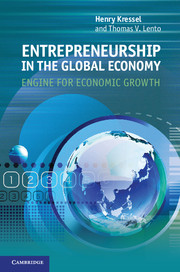Book contents
- Frontmatter
- Contents
- Figures
- Tables
- Acknowledgments
- Introduction
- 1 Government: Boss, financial partner, regulator – Entrepreneurs in mixed economies
- 2 Standing still is not an option: On promoting entrepreneurship and economic growth
- 3 Electronic innovation and the government: David Sarnoff creates the RCA empire
- 4 Global problem, golden opportunity: Ron Stanton profits from market disruption
- 5 Speeding voice and data traffic worldwide: Network microprocessors from RMI
- 6 A world leader emerges: SanDisk and flash memories
- 7 Implementing information technology across the globe
- 8 Three startups in China: Entrepreneurs in a controlled economy
- 9 Connecting the wireless networks of the world
- 10 Building an economy: Government planning vs. entrepreneurial innovation
- Select bibliography
- Index
8 - Three startups in China: Entrepreneurs in a controlled economy
Published online by Cambridge University Press: 05 August 2012
- Frontmatter
- Contents
- Figures
- Tables
- Acknowledgments
- Introduction
- 1 Government: Boss, financial partner, regulator – Entrepreneurs in mixed economies
- 2 Standing still is not an option: On promoting entrepreneurship and economic growth
- 3 Electronic innovation and the government: David Sarnoff creates the RCA empire
- 4 Global problem, golden opportunity: Ron Stanton profits from market disruption
- 5 Speeding voice and data traffic worldwide: Network microprocessors from RMI
- 6 A world leader emerges: SanDisk and flash memories
- 7 Implementing information technology across the globe
- 8 Three startups in China: Entrepreneurs in a controlled economy
- 9 Connecting the wireless networks of the world
- 10 Building an economy: Government planning vs. entrepreneurial innovation
- Select bibliography
- Index
Summary
China’s entrepreneurs provide valuable lessons in managing effectively in an unpredictable context … Besides the usual challenges, Chinese companies face extremely high levels of uncertainty across multiple dimensions … Executives in China must anticipate and react quickly to a constantly changing environment.
China’s influence on the global economy has been a recurring topic of discussion in this book – and in the world at large. How could it be otherwise? It is literally changing the balance of economic and political power among nations.
Just thirty-five years ago this would have seemed impossible. The country was in social and economic turmoil following Mao Zedong’s Great Proletariat Cultural Revolution. In a resolution issued on June 30, 1981 the Chinese Communist Party said that this initiative, “which lasted from May 1966 to October 1976, was responsible for the most severe setback and heaviest losses suffered by the party, the state and the people since the founding of the People’s Republic.”
Today China has recovered from this low point to become the world’s second largest economy. Its factories churn out consumer goods and industrial products for export to every part of the globe. Its balanceof- trade surplus is the envy and despair of its trading partners. The Chinese people are increasingly affluent, buying modern conveniences and luxury goods that many never dared to dream of possessing.
- Type
- Chapter
- Information
- Entrepreneurship in the Global EconomyEngine for Economic Growth, pp. 189 - 209Publisher: Cambridge University PressPrint publication year: 2012



